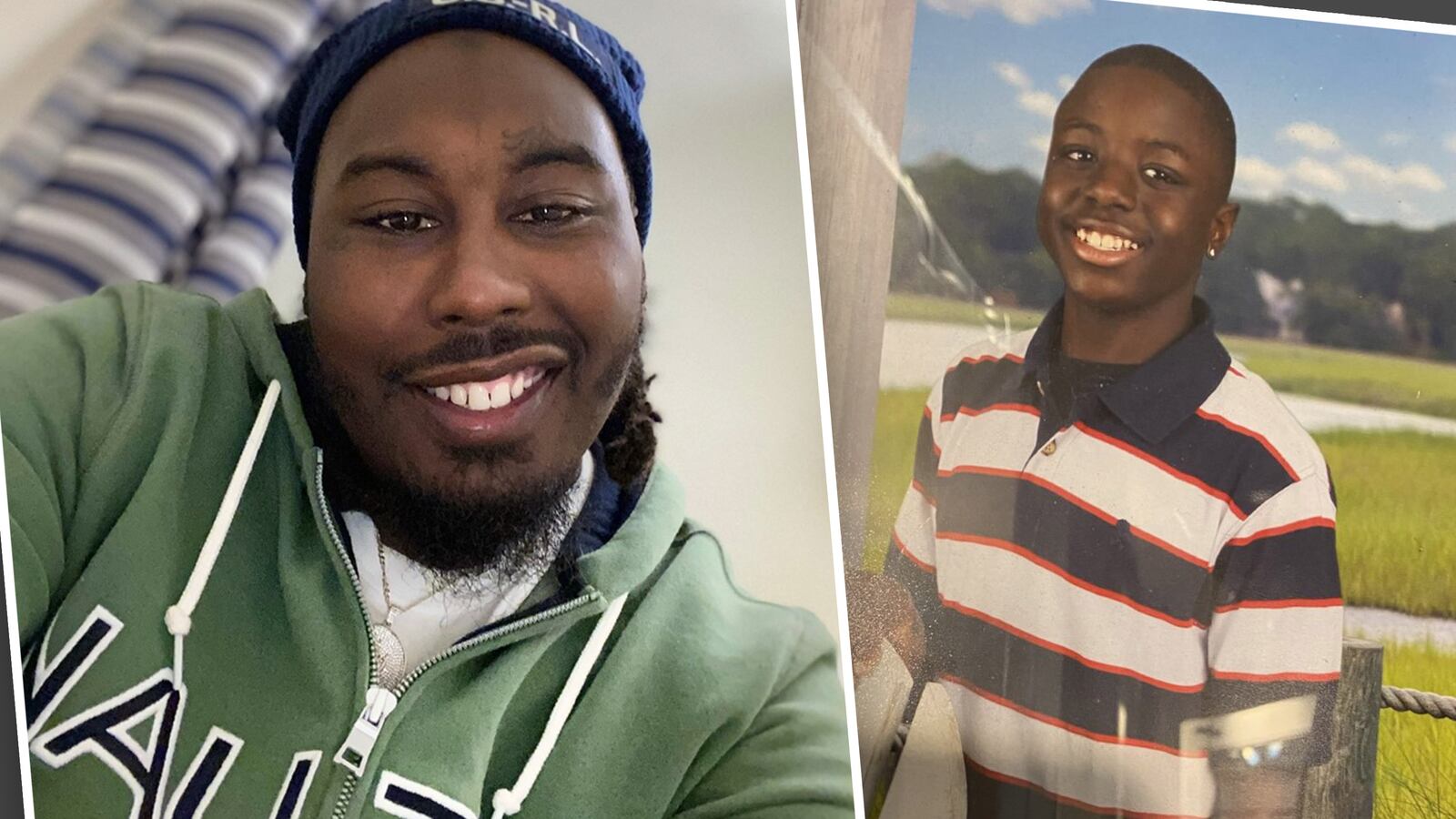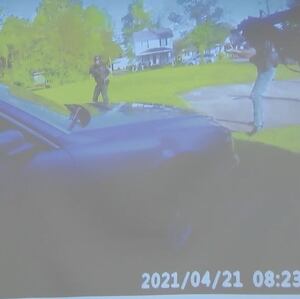Three months before Andrew Brown Jr. was fatally shot by police in his car in Elizabeth City, North Carolina, Lymond Moses was surprised around 1 a.m. one morning by cops peering into his own vehicle.
According to the New Castle County, Delaware, Police Department, on Jan. 13, 2021, officers began to investigate a “suspicious” car parked on a side street. In a snippet of body-camera video released by authorities, officers can be seen flashing a light into Moses’ parked car as the 30-year-old Black man looks back in confusion. The police are heard telling him they were in the area looking for stolen cars when they found him. With the light flashes on him, they also see that he has some weed lying around. The police can be heard saying they are trying to help Moses out—that the weed is no big deal.
He responds that he is OK, and that his mother lives close by. But he would be dead within minutes.
When an officer asks Moses to get out of the car, he instead speeds off with the doors open, veering in the direction of what appears to be a dead-end. As he makes a U-turn, officers position their cars in the road to block him. They get out with their guns drawn. Two officers approach his car as he accelerates and veers away, apparently trying to get past them.
The officers yell “don’t do it” before unleashing nine shots, according to a lawsuit filed by his family.
Moses was pronounced dead at the scene. In a statement released after the shooting, the New Castle County Police Department said Moses “drove at a high rate of speed directly at the officers” before they fired. Prosecutors have yet to announce whether any officers will be charged in connection with the episode; a spokesman for the Delaware Attorney General told The Daily Beast that the investigation was “still active.” In Brown’s case in North Carolina, a local prosecutor announced the cops who shot him would not be charged Tuesday.
But even with divergent circumstances—Brown was being served with arrest and search warrants—these incidents and others highlight what critics have long described as a pervasive pattern of cops fatally shooting people attempting to flee in cars. Almost inevitably, authorities suggest cars are deadly weapons as a justification for fusillades of bullets.
“I’m just scared that they’re going to say the very same thing,” Amanda Spence, Moses’ widow and partner of 10 years, told The Daily Beast of her husband’s case. “‘Oh, he put them in danger so…’”

Lymond Moses, 30, who was shot and killed in Wilmington, Delaware, on Jan. 13, 2021.
Courtesy Amanda SpenceOn Tuesday, Pasquotank County District Attorney Andrew Womble said the officers who shot at Brown in his car near his home on April 21 “reasonably believed that the deadly force was justified.” To make his case, Womble pointed to snippets of newly released body-camera footage that show Brown attempting to drive away from officers attempting to arrest him, causing some of them to move out the way to evade him and shoot into the car after he has passed them.
Spence, 31, said the situation looked “very similar” to that of Moses trying to get away from police in January. She argued that, in both cases, officers had already been out of harm’s way after the car drove past. “He went in between them, so what is the justification behind you taking someone’s life just because they’re trying to get away?”
On Tuesday, Womble said in his press conference that officers exercised a lot of caution in approaching Brown because of a drug-related investigation into him that included controlled buys of heroin and cocaine. He said that Brown had also previously resisted arrest and that, due to Brown’s charges, officers “could not simply let him go.”
Spence said she understood that Brown had a criminal record and was looking to avoid arrest. But she said that shouldn’t have resulted in his death. “But just the simple fact that you couldn’t arrest them means you kill them? I don’t get that,” she said. “I could see if they were a serial killer.”
Spence was far from alone in watching the footage of Brown’s demise with equal parts horror and familiarity.
In November 2020, Sincere Pierce, 18, was shot and killed by a Brevard County, Florida, Sheriff’s Deputy. The car, driven by his friend, Angelo Crooms, 16, was believed to be a stolen vehicle that had fled an attempted traffic stop 15 minutes before the shooting that morning, according to Brevard County State Attorney Phil Archer.
When Deputy Jafet Santiago Miranda and another deputy came upon the teens in a Volkswagen Passat, they followed the car until it came to a stop on a driveway, according to Archer.
Santiago and another deputy soon drew their guns and got out of their cars. In dashcam video released by police, Crooms can be seen backing out the driveway and attempting to slowly drive away as an officer yells “stop the vehicle.” Crooms instead drives the car away from the blocked road, but also in the direction of Santiago, who fires directly into the car.
Both Crooms and Pierce were killed. Despite public outcry, Archer announced last month that Santiago would not face charges. “The evidence shows that Deputy Santiago was standing directly in front of an accelerating car, essentially a 3,000-pound deadly weapon, and in a sworn statement said that he was in fear for his life,” he wrote.
Cynthia Green, Pierce’s aunt, told The Daily Beast that she was a witness to the shooting, which she said occurred not far from her house, only minutes after Pierce had left. Green, 63, said she was still dumbfounded by the decision not to charge Santiago. She questioned the policies officers have in place when dealing with vehicles. “You just can’t just start shooting into a car,” she told The Daily Beast. She argued Santiago didn’t care if there was a child in the car or not—“he just went ahead and started firing.”
“How can you find that justified?” she asked.
Green said that when she learned about Brown’s shooting in North Carolina, she thought about her nephew all over again. “I read about it and heard about it on the news and I said, ‘Lord, they did it again’.”
After watching the video of his shooting herself, she said, she believed Brown’s car was closer to officers than the car her nephew was in—and said that police had a right to be there, since they were serving a warrant. But she still thought other measures could have been taken, like shooting out the tires.
“They killed him over a warrant? Come on, now. Be for real.”
Her family has since filed a federal lawsuit against Santiago and Wayne Ivey, the Brevard County Sheriff. Attorneys representing both men did not immediately respond to a request for comment.
Green said her family has also appealed to the Department of Justice for a federal investigation. William Daniels, a spokesman for the U.S. Attorney’s Office for the Middle District of Florida, told The Daily Beast he could not “confirm or deny” an investigation until someone has been officially charged.

Sincere Pierce, 18, who was killed by a member of the Brevard County Sheriffs Office in November, 2020.
Photo Courtesy Cynthia GreenSpence has also filed a federal lawsuit of her own in Delaware. And she said she has made an appeal to the Justice Department through a local NAACP chapter. She noted that she’s also called out to President Joe Biden, a native son of her state, in news conferences and protests.
The U.S. Attorney’s Office for the District of Delaware did not immediately respond to a request for comment.
In the meantime, Spence said, she has helped organize numerous protests and rallies in support of Moses and his case. She said she was perturbed by the fact that the New Castle County Police Department has yet to release the names of the officers who took part in Moses’ shooting four months later.
As a nurse, she added, she would never be given so much leeway if she made a mistake that cost someone else’s life. She wondered out loud what could be done to figure out a way to keep people like Moses, Brown, or Pierce alive.
In the end, she seemed defeated. “I don’t know where to go from here. What can we do to change this?”



